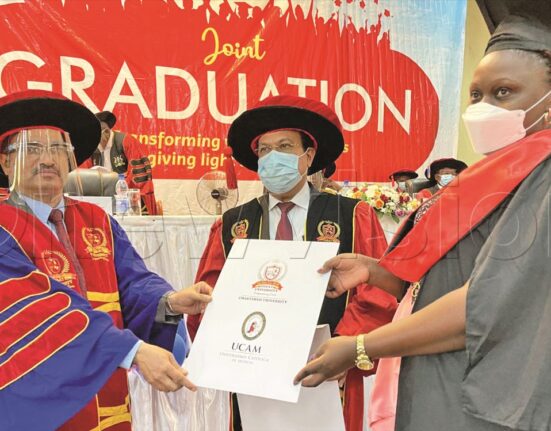This article was first published in the New Vision on March 24, 2021
By Vision Reporter
With the growing level of unemployment and technology advancements, universities are advised to train job creators and not job seekers, says Prof. Badru Kateregga, the former chairperson of the Vice-Chancellors Forum.
“No matter the qualification any university may offer its students, with the high level of industrial revolution, we must change how we look at the education of our students. Students must have the entrepreneurial mind and then the skills, to start small businesses and ventures, for the betterment of the economy and their own livelihoods,” Kateregga says.
This was the core of his remarks, at the virtual graduation ceremony of the East African University, Rwanda at the start of this month. The event, was jointly done with two teams, one in Uganda and the other in Rwanda — connecting through Zoom and Facebook live. East African University, Rwanda is a sister university to Kampala University in Uganda and East Africa University, Kenya.
A total of 330 students graduated with bachelors and diplomas.

The ceremony was officiated by the chancellor, Prof. Mondo Kagonyera. Also present was Prof. Kateregga, the chairperson of the board of trustees and Jolly Irankunda Shubaiha Kateregga, the chief executive director of the board of trustees.
Others at the graduation were Fred Mufulukye, the governor of eastern province in Rwanda, who was the guest of honour.
Prof. Kateregga added: “All universities must have demand-driven, practical and innovative programmes which can enable our graduates to create their enterprises and provide employment, instead of seeking employment, if we are to save East Africa.”
The governor of eastern province in Rwanda said: “All universities must help their graduates to be of great value to the society in creating jobs for their countries’ economic growth, and their own well-being. He also called upon the universities, to train graduates, who are of value to the nation.

Deeper Reality Of Skills Gap
The 2016 Jobs for Youth in Africa Report by the African Development Bank (AfDB), shows that almost 420 million youths in Africa are unemployed.
The International Labour Organisation (ILO) shows that the number of unemployed youths on the continent is expected to reach 830 million by 2050.
Research conducted by the World Economic Forum (WEF) shows that Africa will contribute more people to the workforce each year than the rest of the world combined by the year 2035.
The continent is expected to have a population of 1.25 billion people of working age by 2050. To ably absorb these new entrants to the workforce, Africa needs to create more than 18 million new jobs each year.
More so, the Uganda 2019 Labour market profile shows that the youth unemployment rate in the country stands at 13%.
According to the Uganda Bureau of Statistics, the unemployment rate is high, even among those who have attained formal education.
This is due to the disconnect between the degree achieved and the skills needed for the jobs.
Michael Niyitegeka, an information and communications technology expert, says we are at the edge of the fourth industrial revolution (4IR), the next phase of living, which is sparked by advanced technologies.
“Virtual reality and artificial intelligence influence many aspects of our lives and as these will continue to advance, so will be the way we work. This will increase the level of unemployment of our graduates, if they are not well skilled. However, it can also create an opportunity for graduates to start technology initiatives,” he says.
He says due to the speed of these technological advancements, students should seek education institutions, which appreciate the challenge to keep up with the technological changes of our lives; lest they land in the growing skills gaps and resultant unemployment.
Niyitegeka says students should look for institutions that always update their curricula, have a great connection with the work industry and always support new initiatives.
A 2019 report by the European Commission predicted that there would be 756,000 unfilled jobs in the European ICT sector by the end of last year, something which is only set to increase as we move further into the 4IR.
The 2018 World Economic Forum Report on the future of jobs, says: “Disruptive changes to business models will have a profound impact on the employment landscape over the coming years. Many of the major drivers of transformation affecting global industries are expected to have a significant impact on jobs, ranging from significant job creation to job displacement.”
Over time, experts in economies all over the world, have come to agree that a lot has to be done by universities, parents and government to prepare the students differently.
Most of the available jobs today, experts predict, will be no more in the next 10 years; with the evolution of technology.
Effect of Gig Economy
Michael Niyitegeka, an ICT expert, notes that today’s graduates, “are joining a workforce where the gig economy is having a big measure of the competition with the traditional jobs.
A gig economy, he explains, refers to digital platforms that allow independent freelancers to connect with individuals or businesses for short-term services. A case in point, could be youth vending home use items online as opposed to working for the company that sells the same products.
This gig economy includes consultants, independent contractors, freelancers and on-demand workers.
Students, the report says, are nowadays facing an economy in which alternative work arrangements are growing faster than traditional full-time jobs.
“They are also projected to keep growing, globally,” he adds









Leave feedback about this